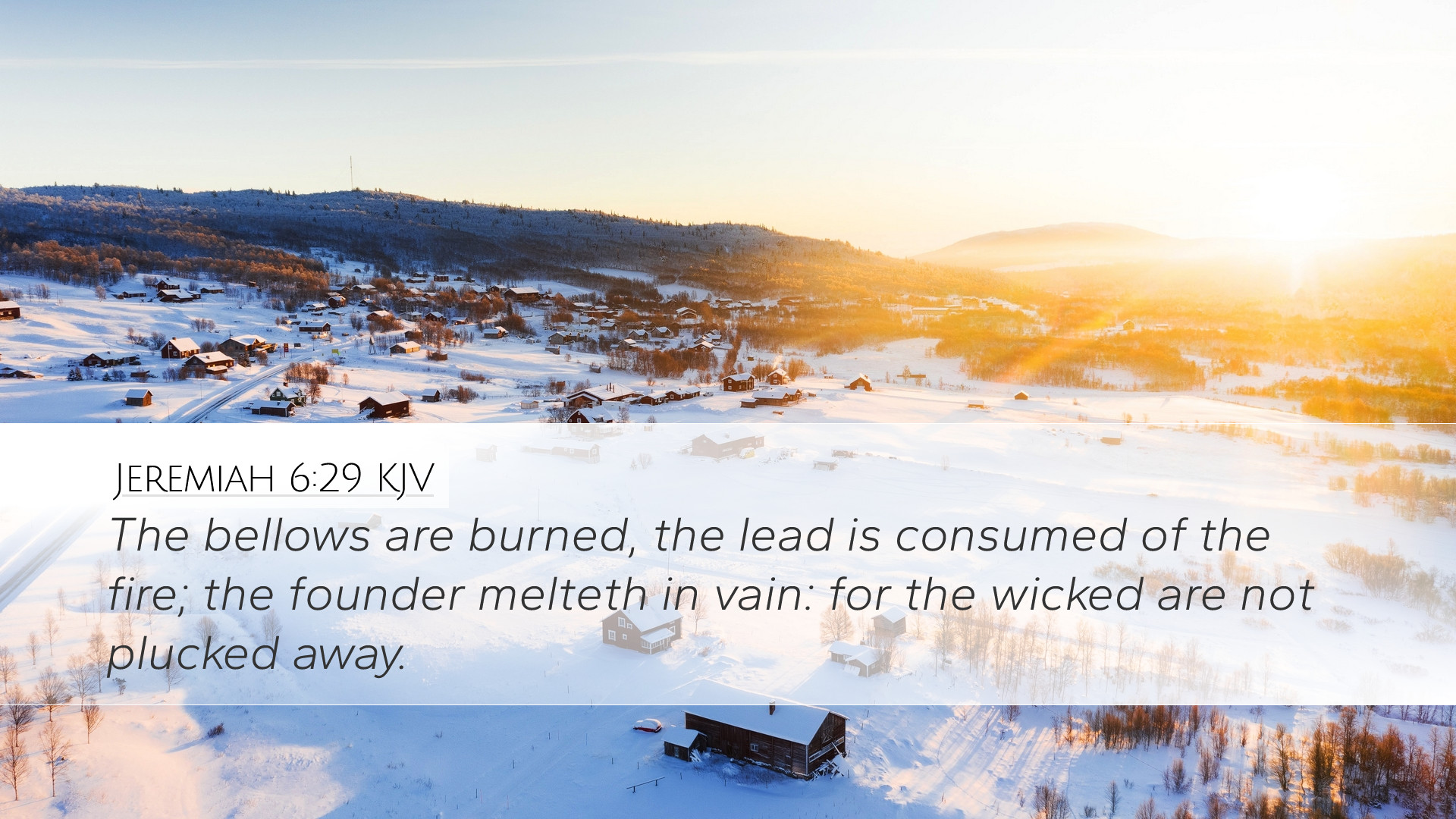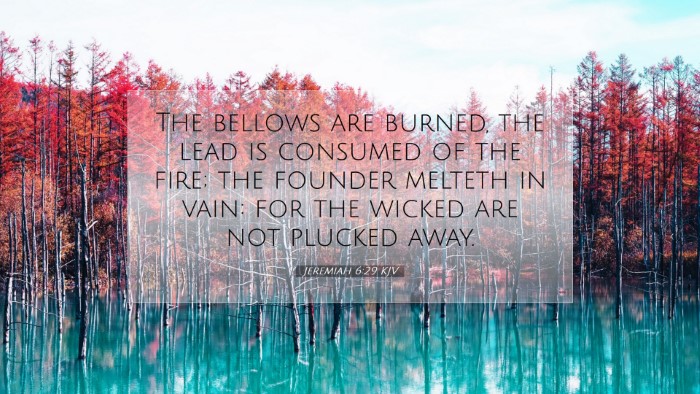Commentary on Jeremiah 6:29
Verse: "The bellows are burned, the lead is consumed of the fire; the founder melteth in vain: for the wicked are not plucked away."
Introduction
Jeremiah 6:29 is a verse that presents a vivid imagery of the futility and devastation of a corrupt society. The prophet Jeremiah, often known as the weeping prophet, conveys God's lament over Jerusalem’s impending judgment. Through the metaphor of metalwork and the bellows used in the refining of metals, this verse reflects deep spiritual truths about judgment, the hardness of the people's hearts, and the consequential failure of divine efforts in the face of rampant wickedness.
Contextual Background
This verse is situated within a larger discourse where God, through Jeremiah, warns of the coming destruction of Jerusalem. The people are entrenched in sin, evidenced by their stubborn refusal to heed prophetic warnings. The imagery of the bellows and the metalworker serves as a stark representation of Israel’s spiritual state and the efforts of God to purify His people.
Commentary Insights
1. The Bellows and the Process of Refining
The allusion to the bellows indicates the process of refining metal, which involves intense heat to purify and remove impurities. Matthew Henry emphasizes that the “bellows” symbolize God’s efforts to purify His people. However, the verse poignantly states that the lead is "consumed of the fire," highlighting that the very tools and processes intended for refining are rendered ineffective due to the pervasive wickedness among the people.
2. The Lead and the Nature of Rebellion
In ancient metalworking, lead was often used as a flux to help separate impurities from gold or silver. Albert Barnes notes that while the fire is meant to bring about purification, the circumstances reveal that the lead itself gets consumed. This failure of the process signifies that the necessary cleansing is absent. The people’s resistance to God's guidance left them spiritually unyielded, demonstrating a tragic irony where divine intentions meet human obstinacy.
3. The Founder and In vain Efforts
Jeremiah’s reference to the founder— or metalworker—melting in vain serves as a portrayal of the futility of righteous efforts directed toward an unrepentant people. Adam Clarke comments that the founder’s attempts are thwarted by the persistent wickedness of his audience. The imagery reveals a somber reality: God’s efforts to reveal truth and righteousness are reduced to naught when met with hard hearts. This underscores the tragic tension between divine mercy and human rebellion.
4. The Central Theme: The Wicked Not Plucked Away
The concluding phrase emphasizes the crux of the message: “for the wicked are not plucked away.” Here, the term “plucked away” refers to a divine intervention aimed at removing evil. Matthew Henry contemplates the implications of this statement, asserting that the failure to remove wickedness leads to inevitable judgment. It shows a God who longs for repentance but is met with resistance, compelling readers to understand the dire consequences of unrepentant hearts.
Theological Implications
This passage reverberates with fundamental theological themes that pastors, students, and scholars must wrestle with:
- God's Holiness and Justice: The verse encapsulates God's nature—He is holy and desires purity among His people. The refusal to achieve this purity results in disaster.
- The Urgency of Repentance: The hopelessness depicted calls for urgent introspection. People are encouraged to examine their hearts in light of God’s pressing desire for righteousness.
- The Reality of Divine Grace: Despite the warnings, the opportunity for repentance lingers. This divergence between grace and judgment prompts believers toward evangelism and fervent prayer for restoration.
Conclusion
Jeremiah 6:29 serves as a poignant reminder of the cost of unrepentance and the dire consequences of a nation that neglects its moral and spiritual obligations. It underscores the depth of God's desire for His people to be refined, calling them away from the fires of judgment into the light of redemption. As such, pastors, theologians, and students are urged to reflect on their spiritual condition and that of their communities, encouraging a heartfelt return to God amidst overwhelming societal despair.


